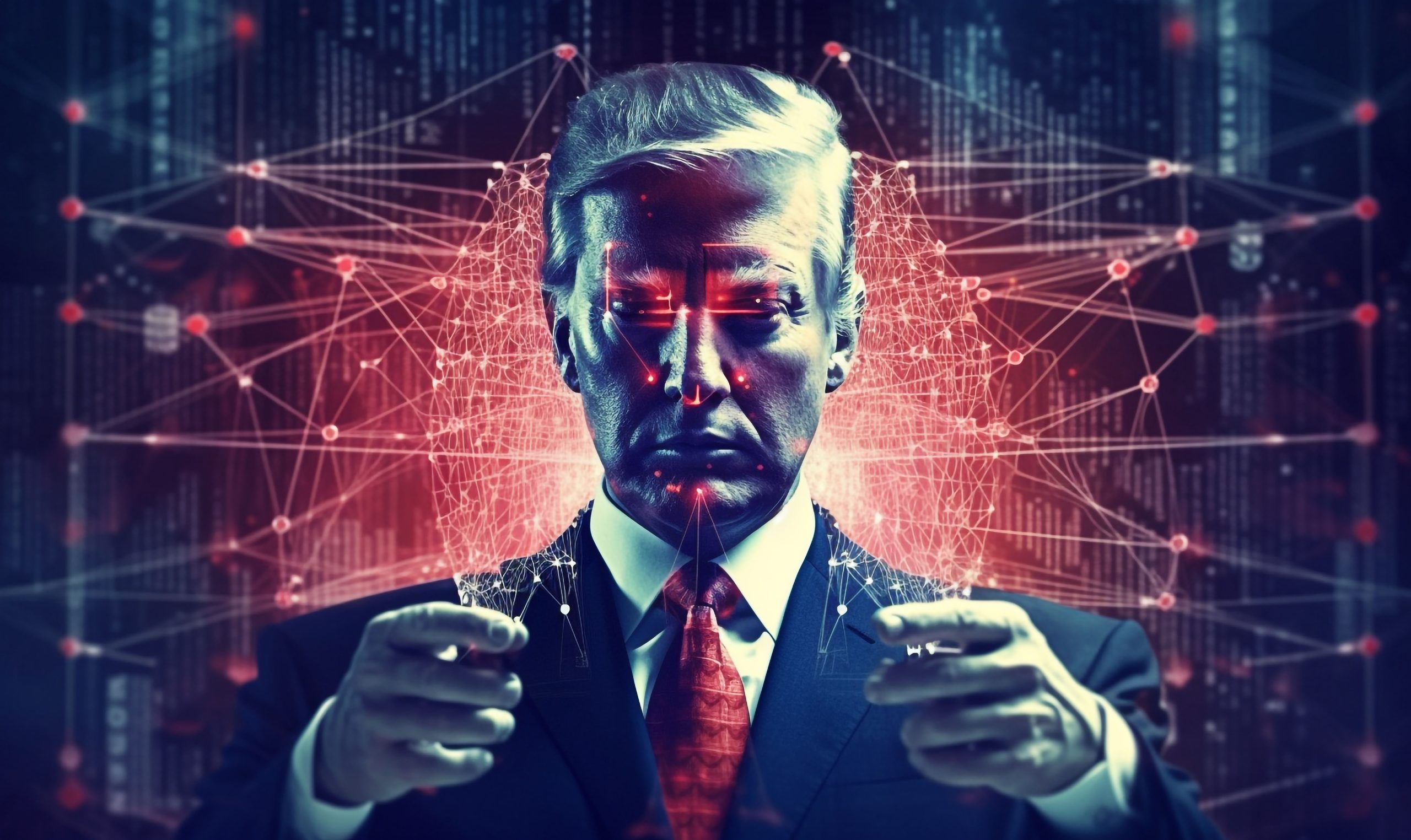Curious about how AI will shape the 2024 US elections? Discover the potential impact of artificial intelligence on our democratic processes. From election security to voter suppression, AI algorithms can revolutionize the political landscape. Identify and mitigate cybersecurity threats, ensure fair district boundaries, and streamline election administration. AI-powered tools enhance political advertising effectiveness, detect misleading content, and provide transparency to voters. Explore the benefits, risks, and measures needed to harness AI’s potential effectively. Step into the future and envision the possibilities.
Rapid Evolution of Digital Technology
In the rapid evolution of digital technology, the creation of extensive digital content has blurred the lines between real and fake content, revolutionizing the landscape of election campaigns. The digital revolution has brought forth new challenges for political campaigns, particularly with the rise of deepfakes and AI-generated voices. These innovative tools have given politicians the ability to rapidly create and disseminate messages, but they have also raised concerns about the authenticity and credibility of the content being shared.
Deepfakes, which are manipulated videos or images that appear to be real, pose a significant challenge in the political realm. With the power of AI, individuals can create convincing deepfakes that can be used to spread misinformation or manipulate public opinion. The ability to generate realistic voices using AI further complicates the issue, as it becomes increasingly difficult to distinguish between real and fake audio content.
To navigate this landscape, politicians must adapt and utilize innovative tools to combat the spread of misinformation. It is crucial for campaigns to invest in advanced technologies that can detect and verify the authenticity of digital content. Additionally, educating the public about the existence and implications of deepfakes is essential to foster a more discerning audience.
As the digital revolution continues to shape the political landscape, it is imperative that measures are put in place to ensure the integrity and transparency of election campaigns. This includes implementing regulations and guidelines for the use of AI-generated content, as well as fostering collaboration between tech companies and policymakers. By staying ahead of the deepfake challenge and leveraging innovative tools, political campaigns can navigate the digital era while maintaining trust and credibility.
Influence of Artificial Intelligence on Elections
As you delve into the influence of artificial intelligence on elections, it is important to consider the significant role AI plays in shaping the digital landscape of election campaigns. AI has a profound impact on various aspects of the electoral process, including voter engagement, campaign fundraising, political messaging, campaign strategies, and election forecasting.
AI’s impact on voter engagement is substantial. With AI-powered algorithms, campaigns can analyze vast amounts of data to understand voters’ preferences, behaviors, and concerns. This enables them to tailor their messages and outreach efforts to resonate with specific voter segments, increasing engagement and mobilization.
Furthermore, AI plays a crucial role in campaign fundraising. AI algorithms can analyze donor data and patterns to identify potential supporters and optimize fundraising strategies. By leveraging AI, campaigns can target their fundraising efforts more effectively, reaching out to individuals who are more likely to contribute.
In terms of political messaging, AI has the ability to analyze public sentiment and detect trends in real-time. This allows campaigns to tailor their messaging to address the concerns and priorities of voters. AI can also help identify and respond to disinformation and fake news, ensuring that accurate and reliable information reaches the public.
AI’s effect on campaign strategies is also significant. AI algorithms can analyze vast amounts of data to identify patterns, predict outcomes, and inform campaign decisions. This allows campaigns to allocate resources strategically, target key battleground states, and optimize their overall strategy for maximum impact.
Lastly, AI has implications for election forecasting. By analyzing historical data, voter demographics, and other relevant factors, AI algorithms can generate accurate predictions and forecasts regarding election outcomes. This information can be invaluable for campaigns in terms of resource allocation, messaging, and overall strategy.
Worrisome Developments Facilitated by Digital Technology
The worrisome developments facilitated by digital technology include the blurring of lines between real and fake content in the political landscape. This has been driven by various factors such as deepfake manipulation, disinformation campaigns, fake news proliferation, social media manipulation, and cybersecurity threats. Here are three key concerns:
- Deepfake manipulation: The rise of deepfake technology allows for the creation of highly realistic fake videos and audio, making it difficult to discern what is real and what is fabricated. This poses a significant threat to the integrity of elections, as politicians could be portrayed saying or doing things they never did, leading to confusion and misinformation among voters.
- Disinformation campaigns: The spread of false information through disinformation campaigns has become a widespread issue in the digital age. Political actors and foreign entities can use social media platforms to disseminate false narratives, manipulate public opinion, and undermine trust in democratic processes.
- Cybersecurity threats: With the increasing reliance on digital systems for election processes, cybersecurity threats have become a major concern. Hackers can target voting systems, manipulate voter data, and disrupt the electoral process, potentially compromising the integrity of the election results.
It is crucial for policymakers, tech companies, and society as a whole to address these worrisome developments and find effective solutions to ensure the transparency, authenticity, and security of the political landscape in the digital age.
Need for Transparency and Authenticity in Ai-Driven Political Landscape
To address the worrisome developments facilitated by digital technology, it is imperative that you prioritize transparency and authenticity in the AI-driven political landscape. As AI continues to play a significant role in elections, transparency challenges, accountability measures, regulatory debates, public trust concerns, and AI-generated disinformation have become critical issues that need to be addressed.
Transparency challenges arise from the use of AI in political campaigns. AI-generated political ads, for example, can be difficult to distinguish from authentic content, leading to confusion among voters. Debates on transparency and accountability have sparked discussions on the need for regulatory measures to ensure the integrity of democratic processes. It is crucial to maintain public trust in the political landscape by addressing these concerns.
Accountability measures must be put in place to hold AI systems and their creators responsible for any misuse or manipulation. Regulatory debates should focus on establishing clear guidelines and standards for the use of AI in politics, ensuring that it is used ethically and responsibly.
Furthermore, the rise of AI-generated disinformation poses a significant threat to the political landscape. Deepfakes and AI-generated voices can be used to spread false information and manipulate public opinion. Therefore, it is essential to develop strategies to detect and counteract AI-generated disinformation, safeguarding the authenticity of political discourse.
Impact of AI on the Political Landscape
AI is set to significantly transform the political landscape leading up to the 2024 US elections. As we delve into the impact of AI on the political landscape, we can expect to see three key areas of transformation:
- AI’s role in voter engagement: AI has the potential to revolutionize how political campaigns interact with voters. Through personalized messaging and targeted outreach, AI can help campaigns connect with voters on a more individualized level, increasing voter engagement and promoting a sense of political empowerment.
- AI’s impact on campaign strategies: With the help of AI algorithms, campaigns can analyze vast amounts of data to gain insights into voter preferences and behavior. This allows for more strategic campaign planning, enabling candidates to tailor their messages and policies to resonate with specific voter segments. AI can also optimize advertising spending by identifying the most effective platforms and channels for reaching target audiences.
- AI’s influence on political discourse: AI-powered tools can analyze social media conversations and public sentiment, providing valuable insights into the current political climate. This information can help politicians and campaign strategists shape their messages and address relevant issues, fostering a more informed and nuanced political discourse.
While AI holds great promise for the political landscape, it also raises concerns about election integrity. Safeguards must be put in place to prevent the manipulation of AI-generated content or the use of AI algorithms to spread misinformation. Additionally, efforts should be made to ensure that AI does not disproportionately impact certain voter demographics or perpetuate biases. By leveraging the benefits of AI while addressing these risks, we can create a political landscape that is more engaging, strategic, and representative of the diverse voices in our society.
Impact on Election Security
Enhance election security with AI algorithms that detect and mitigate cybersecurity threats during the 2024 US elections. AI-driven cybersecurity has the potential to revolutionize the way we protect the integrity of our democratic processes. By leveraging advanced machine learning techniques, AI can analyze vast amounts of data to identify and prevent hacking attempts on voting systems. It can also detect patterns of voter fraud, ensuring the accuracy and fairness of the election.
One crucial aspect of election security is monitoring social media platforms for disinformation campaigns targeting the election. AI can assist in this task by analyzing large volumes of social media data and identifying suspicious patterns and trends. By flagging and removing misleading content, AI can help maintain an informed electorate.
Furthermore, AI can improve the efficiency of ballot counting processes. With its ability to process data quickly and accurately, AI can streamline the counting process and reduce the chances of human error. This not only ensures a more efficient election but also enhances public trust in the electoral system.
In addition to these measures, AI can also aid in voter data analysis to identify instances of voter suppression. By analyzing voter registration and identification processes, AI algorithms can detect patterns of discriminatory practices and propose fairer district boundaries.
To fully harness the benefits of AI in election security, it is crucial to ensure transparency, accountability, and ethical use of AI technologies. Collaboration between the government, private sector, and non-profit organizations is necessary to develop guidelines and regulations that safeguard the integrity of elections while leveraging the power of AI to enhance democracy.
Voter Suppression
In addressing the issue of voter suppression, AI algorithms can play a crucial role in identifying and rectifying instances of discriminatory practices through the analysis of voter data. Here are three ways AI can address voter suppression:
- Addressing disparities: AI algorithms can analyze voter data to identify disparities in voter registration and identification processes. By detecting patterns of discriminatory practices, AI can help ensure that all eligible voters have equal opportunities to participate in elections.
- Preventing discriminatory practices: AI can assist in analyzing gerrymandering, the manipulation of district boundaries to favor a particular political party. By proposing fairer district boundaries, AI can help prevent the dilution of minority votes and promote more representative elections.
- Ensuring voter accessibility: AI-powered tools can provide accessible information to voters, reducing barriers to participation. By offering real-time language translation, voter assistance, and information on polling locations and resources, AI can help ensure that all voters have equal access to the voting process.
Election Administration
Streamline election administration processes by leveraging AI technology. AI has the potential to revolutionize various aspects of election administration, including voter registration, verification, support, resource allocation, and demographic analysis. With AI in voter registration, the accuracy and efficiency of the process can be enhanced, ensuring that duplicate registrations are prevented and the voter database is up to date. AI in voter verification can help verify the identity of voters, reducing the risk of fraudulent activities. AI-powered chatbots can provide instant support and information to voters, improving accessibility and addressing their queries promptly. Moreover, AI can predict voter turnout based on historical data and other factors, allowing for effective resource allocation and planning. By analyzing demographic data, AI can ensure equitable representation in election processes, identifying any disparities and taking appropriate measures. Overall, the use of AI in election administration can streamline processes, reduce human error, and improve efficiency, ultimately contributing to the smooth conduct of elections.
Political Advertising
AI technology has the potential to revolutionize political advertising in the 2024 US elections by targeting ads more effectively and detecting false or misleading content. Here are three key aspects to consider:
- AI-generated ads: With AI algorithms analyzing vast amounts of data, political campaigns can create personalized advertisements that resonate with specific voter demographics. By understanding voter preferences and behaviors, AI can help political campaigns tailor their messages to maximize impact.
- Regulatory measures: As AI becomes more prevalent in political advertising, there is a need for regulatory measures to ensure transparency and accountability. Ethical guidelines should be established to prevent the spread of false or misleading information and to protect the democratic process. Governments, private sectors, and nonprofits should collaborate to develop these guidelines.
- Transparency concerns and accountability issues: The use of AI in political advertising raises concerns about transparency and accountability. Voters should be able to easily identify who is behind political ads and understand the motivations behind them. AI-powered tools can provide the necessary transparency to allow voters to make informed decisions.
Harnessing the Benefits and Addressing Risks
To effectively harness the benefits and address the risks of AI in political advertising for the 2024 US elections, it is crucial for stakeholders to collaborate and establish ethical guidelines and regulatory measures. The use of AI in political advertising has the potential to revolutionize campaigns by enabling more targeted messaging and analysis of vast amounts of data. However, it also raises concerns about transparency, accountability, and the potential for AI bias.
One key aspect of addressing these risks is the development of ethical guidelines. These guidelines should outline the principles and standards that govern the use of AI in political advertising, ensuring that it is used as a tool to enhance democracy rather than replace human decision-making. They should also emphasize the importance of transparency, requiring clear disclosure of the use of AI in political advertising and allowing voters to understand who is behind the ads they see.
Additionally, continuous monitoring and evaluation of AI systems are necessary to identify and address potential risks and vulnerabilities. AI algorithms should be regularly tested for bias and discrimination, and mechanisms should be in place to correct any identified issues. This requires collaboration between government, private sector, and nonprofits to ensure that the necessary expertise and resources are available.




